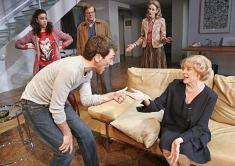The Lady From Dubuque
1980 wasn't such a good year for playwright Edward Albee. His play 'The Lady From Dubuque' closed on Broadway after a mere 12 performances. But with the recent success of 'Who's Afraid of Virginia Woolf?' (starring Kathleen Turner) under his belt, director Anthony Page has seized his long-awaited chance to tackle Albee's 'flop', this time with Maggie Smith in the lead role as the mysteriously enigmatic 'Lady', with her son, Chris Larkin, acting alongside her.
Even if you've only seen 'Virginia Woolf' you'd recognise this almost instantly as an Albee play. It starts with a party where large quantities of alcohol are being downed, and almost from the start there's bickering and niggling going on between the characters which develops into almost a frenzy later on. It could be 'Virginia Woolf II', if there wasn't a strange kind of twist in the second act.
"Don't you just hate party games?" says one of the characters to the audience. There are several occasions when characters address the audience directly, failing to observe the 'fourth wall', as Albee pointed out in a recent interview. What this really tells you is that the play is not a naturalistic or literal piece - it's using the characters merely as vehicles to carry a message - but the cryptic nature of that 'message' is what frustrates and confuses, and makes the evening less than totally satisfying.
As sparks begin to fly between the 6 'friends', we discover that some of the biting remarks from Jo are not just the result of boredom or irritation with her companions - she's in terrible pain, and seems to be dying. Just before the end of the first half, she has to be carried upstairs to bed by husband Sam, though she can't bear the pain of being carried all the way, and struggles up the last few steps on her own.
It's almost an hour before Dame Maggie makes her entrance, and she has to get in her (rather apt) first line - 'Are we in time?' - pretty damn quick to avoid the curtain falling on her, or being pushed out of the way by the ice-cream sellers. But it will be no surprise to anyone that it's an entrance that has real star quality to it with an almost electro-magnetic field energised around her. And when she's back on stage after the interval, you can almost feel the audience - who were rather subdued in the first half - coming to life as Smith gets into her formidable and seemingly effortless stride.
At first, the 'Lady' and Oscar, her companion - a black man in a business suit with a handy line in karate, but rather camp mannerisms - seem to be toying with Sam as he demands to know who they are. After a protracted, humorous and rambling discussion, 'The Lady' claims to be Jo's mother. But this cuts no ice with Sam whose recollections of Jo's mother are not remotely reflected in the person in front of him. But when Jo comes downstairs, she immediately falls into the arms of 'The Lady', and Sam is restrained by Oscar and ends up tied to the staircase incapable of having any effect on the unfolding situation.
For those with an eye for trivia, Dubuque is a city of around 60, 000 souls on the Mississippi, named after an early european settler. I'm not sure what the relationship is between the mysterious 'Lady' and this city, except perhaps a reference to 'the little old lady from Dubuque' made by a newspaper editor. Certainly, there's a political edge to this play. Well, there must be given that Marks, Engels and Nixon are all named in the piece. Maybe Albee is asking 'Who, or what is America?' or maybe he's asking something completely different. Plenty of questions here, but not much in the way of answers. For some, the 'Lady' might be the 'Angel of Death', though it seems to me that that role is more appropriate for The Lady's companion, Oscar.
Ultimately, even though 'The Lady From Dubuque' is generally well-directed and acted, the question of just who 'The Lady' and her companion are and how they relate to a bigger picture (if there is one), gets in the way of really enjoying the piece. And with the Haymarket breaking new ground with a £4 price tag for programmes - which strikes me as being the wrong side of outrageous - one leaves with a sense that there's more to worry about here than to applaud.
What the critics had to say.....
NICHOLAS DE JONGH for THE EVENING STANDARD says, "How it mystifies and irritates, disturbs and affects, but leaves you in the dark - provoked and unsatisfied!" PAUL TAYLOR for THE INDEPENDENT says, "Spirited and stylish." MICHAEL BILLINGTON for THE GUARDIAN says, "Silk-smooth production, I was simultaneously tantalised, intrigued, and entertained." CHARLES SPENCER for THE DAILY TELEGRAPH says, "The play is a pretentious dud." BENEDICT NIGHTINGALE for THE TIMES says, "This is a play that teases, tantalises and, without either arresting or exactly boring you, leaves you wondering what the hell it's on about...despite the best efforts of Anthony Page's fine cast, I remained pretty much unimplicated and, worse, uninvolved throughout. "
External links to full reviews from popular press
The Guardian
The Independent
The Times
Daily Telegraph
Production photos by John Haynes
Originally published on
